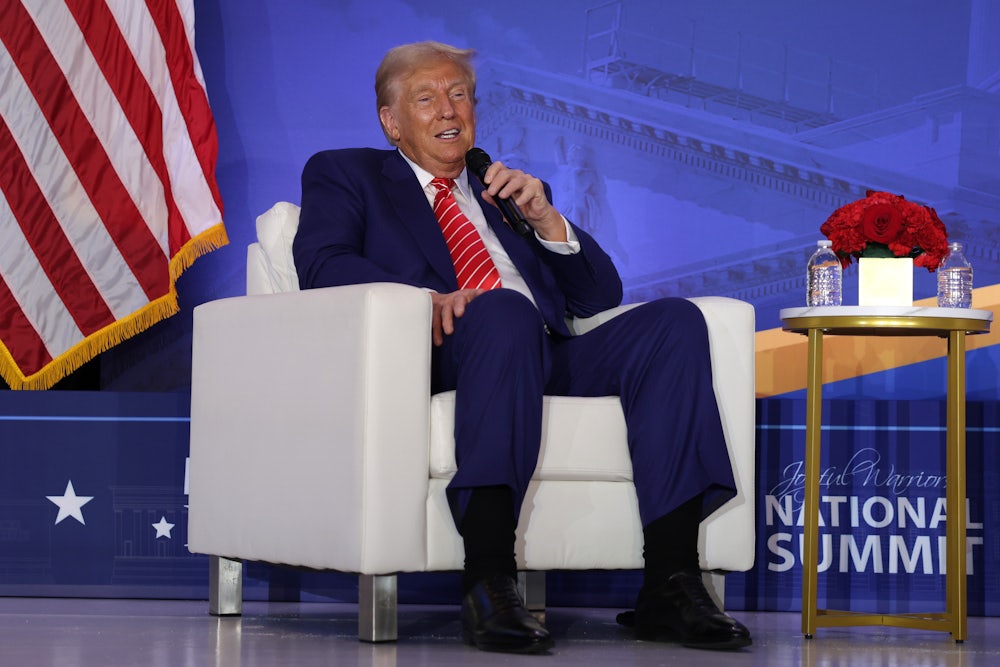If you’re lucky, you missed this one. I was not so fortunate, and so, this Labor Day weekend, I found myself staring at what is probably the worst, most appalling, most offensive, and just plain old asshat-stupid headline I’ve seen on a political story in many years. Sorry, in the interests of an informed public, I consider it my duty to foist it on you.
The story in question was in Politico, ostensibly concerning Kamala Harris’s CNN interview. In case you missed it, there was a moment during the interview when Dana Bash asked Harris about Donald Trump’s remark that Harris had recently “turned Black” for political reasons. You probably know by now what Harris said: “Same old, tired playbook. Next question.”
This was a good answer; it showed she wasn’t going to take the bait. But some genius editor at Politico thought otherwise! Ponder this headline: “‘Next question’: Harris evades questions about her identity.”
Sorry: Evades! What?! Where do we even start with that one? Trump said something dumb, false, malicious, and racist. She didn’t dignify it with a response. That’s evasion? What’s to evade? The story below the headline was fine, and the ridiculous headline got a stealthy edit after the fact. (Good chance that people like you, having to stomach the same nonsense as me, let Politico have it.) The problem, however, is that in today’s media world, sometimes that first headline is all some people see.
It’s emblematic of what the political media in this country are doing so badly in covering this race. With dizzying regularity, Trump lies. He says toxic, antidemocratic things over and over again. And he still gets treated like a normal candidate. It’s often the case that the media, presented with another one of his addled rants, will dive in, scoop, and separate enough words to make it seem like he’s got enough actual gray matter gooping around in his skull to form a complete sentence, and present their director’s cut of his wandering mind for public consumption.
The Democrat, first Joe Biden and now Harris, gets called evasive or worse if he-then-she doesn’t respond to Trump’s ridiculous lies. The effect is to legitimize Trump—in this case, to make it seem as if he raised fair and reasonable questions about Harris’s identity.
But this isn’t even the most glaring recent example of the press lying down on the job. That prize goes to the two New York Times reporters who recently gave us this gem, which ran under another genius headline: “Harris and Trump Have Housing Ideas. Economists Have Doubts.”
You can tell instantly what kind of article this is going to be—one of those classic on-the-one-hand-on-the-other-hand pieces that pretends to weigh evidence in a sober way and absolutely refrains from drawing any conclusions that might give offense to one side or the other. Except that in this case, the conclusion gives offense to anyone with a functioning brain.
It’s worth going into this at a little length. Here’s the story’s second paragraph: “Their two visions of how to solve America’s affordable housing shortage have little in common, and Ms. Harris’s plan is far more detailed. But they do share one quality: Both have drawn skepticism from outside economists.”
First of all: If you’ve been in journalism long enough then you know that you can find economists who’ll say anything, especially when it comes to picking apart a candidate’s plan. More importantly: “Ms. Harris’s plan is far more detailed” is Times-speak, as any veteran reader of that paper knows, for “Harris at least has a plan, while Trump doesn’t have anything close to a plan.”
Which is confirmed two paragraphs later: “Mr. Trump’s plan is garnering even more doubt. He pledges to deport undocumented immigrants, which could cut back temporarily on housing demand but would also most likely cut into the construction work force and eventually limit new housing supply. His other ideas include lowering interest rates, something that he has no direct control over and that is poised to happen anyway.”
Wait a second. Are you kidding me? Trump’s “housing plan” is to deport people? And the most important newspaper in the English-speaking world is taking this idea seriously? What could these reporters—and more importantly, their editor, who is supposed to use his or her years of experience to guide them—be thinking?
This highlights a continuing problem with how the political press deals with a person (a) who historically has very few actual ideas beyond schemes to get himself on television, (b) whose ideas, such as they are, are often unworkable and unconstitutional and un-American and extremist, and (c) who lies about them every time he speaks.
A reality-based article comparing the candidates’ “housing plans” would have gone something like: Harris, who talks about housing all the time on the stump, has a real and reasonably detailed plan that economists say has some good points and bad points; Trump shows no sign of having given even 10 seconds of thought to the housing crisis (on Trump’s 20-point platform, the word isn’t mentioned), and by the way, he spent four years as president, during which time he amassed a thoroughly rotten record on housing and never once showed any interest in ameliorating the affordable housing crisis; how about that?
The article wasn’t soft on Trump. That’s not my criticism. My criticism concerns the very premise of the article—allowing with straight face a Trump spokesperson to sell mass deportation as a housing policy. A reality-based article might then relate in plain English that to the extent that a housing policy can be divined, it’s wholly rooted in an authoritarian, racist (and expensive!) proposal to deport millions of people. If you want to look at it that way, well then, lots of things count as housing policy. Why aren’t we crediting Trump’s great “success” in seeing to it that hundreds of thousands died unnecessarily during the pandemic? That surely helped reduce housing demand! He’s one stable housing-policy genius, clearly.
Shall I go on? Yes, I think I shall.
Politicians make a lot of public appearances. I’ve covered hundreds of them. Usually, the pol doesn’t make huge news. He or she might say something kind of newsworthy, and it’s up to the reporters present to decide what that is. So a typical story ends up being something like, “Speaking to VFW, Biden Emphasizes Military Readiness.”
That’s the normal script. But every so often, a politician says something so … arresting at one of these events that you toss the normal script. You don’t write a general summary of what the pol said. You write a “Can you believe he said this?” piece.
On Saturday, Trump spoke to the Moms for Liberty conference. He said a lot of strange things. But he went on one rant that was patently false and particularly poisonous: “The transgender thing is incredible. Think about it, your kid goes to school and comes home a few days later with an operation. The school decides what’s going to happen with your child, and many of these children, 15 years later, say, ‘What the hell happened? Who did this to me?’”
That, whatever else you want to call it, is news. A presidential candidate accusing schools all over the country of forcing transgender identity upon who knows how many children. Performing operations on children (wait, schools perform operations?) without letting parents know. It’s absolutely detached from reality, funhouse-mirror nonsense. Trump, in uttering this balderdash in public, is either knowingly lying or in precipitous cognitive decline. No third choice, I’m afraid—we’re either in the front half of A Face in the Crowd or the last pages of Flowers for Algernon.
If I were covering that appearance, I’m pretty sure I’d lead with these crucial details—after all, they’re the kinds of details that seemed to matter a lot mere months ago, after a greatly diminished debate performance from Joe Biden drew grave and direct commentary from these same media outlets (and from me). So how did the big dailies cover the event?
The New York Times: “Conservative Moms, Charmed by Trump, Would Rather Avoid His Misogyny.”
The Washington Post: “Moms for Liberty fully embraces Trump and widens role in national politics as election nears.” (That was actually an AP story.)
Incredibly, neither article used the quote about schools operating on kids.
The Los Angeles Times did at least write the right kind of headline: “Trump questions acceptance of transgender people during Moms for Liberty gathering.” Kudos, LAT. However—the article didn’t use the above quote and hardly discussed Trump’s remarks about transgender people at all, mentioning only that he lied (although of course they didn’t use that word) about that Algerian boxer.
What would be un-Times-like about a story headlined: “Trump, at Moms for Liberty Event, Makes Bizarre and False Claims about Schools and Transgender Youth”? That “bizarre” is a soft, Times-ian euphemism, but at least that headline begins to get to the heart of the matter.
This is just one example of something that happens many times a week. At his rallies, he lies constantly, makes toxic accusations ceaselessly. Why aren’t news organizations with the resources to do so—the Times, the Post, CNN, the other networks—systematically analyzing and deconstructing those speeches and keeping specific count of the lies and accusations? Isn’t that journalism’s fundamental job—to tell the truth?
Sadly, many journalists, especially top editors at our country’s leading outlets, think it is not. They think “fairness” is more important. Fairness, in this context, means bending over backward to be fair to Republicans and conservatives so as not to be accused of being liberal. And sometimes it means going out of their way to run a negative piece about a Democrat or liberal so they can say, “See? We’re tough on Democrats too.” See on this point another recent ridiculous New York Times piece about Maryland Governor Wes Moore’s Bronze Star. On its face, it sounds bad for Moore, like he was claiming something he didn’t deserve. But as Josh Marshall noted in an article that shredded the Times piece, if you read down to the fourteenth paragraph, you saw (in the Times’ own reporting!) an entirely plausible explanation for the confusion.
Why did the Times even run that story? So they could brag, “See, we can be tough on a Black Democrat!”
I’m all for being tough on any public official who deserves it. The timing of Tim Walz’s departure from the National Guard, for example, looked sketchy on its face, so thorough reporting was totally justified there. It seems that he told people of his intention to retire several months before the unit had the sense it might be shipped to Iraq. But doing the reporting to find that out was completely necessary. Likewise, scrutiny on things like Harris’s prosecutorial record is fair and needed. And if you want to cast a discerning, critical eye at Harris’s recent interview, why not question why she didn’t have an answer for what she was prepared to do on day one? And if either Harris or Walz spins a crazy tale about high schools performing gender reassignment surgery, you know, call them out on it.
That’s all good. That’s reporting. The media’s failing today is the “fairness” impulse and the urge to put this concept of fairness ahead of truth. I understand why they indulge the impulse—they believe that it will keep MAGA off their backs (although any amount of real reflection would reveal that it doesn’t even do that, really). Is it serving readers to pretend that mass deportations are a housing policy? Reporters and editors need to stop worrying so much about whether what they’re producing is fair and worry a lot more about whether it’s true.










